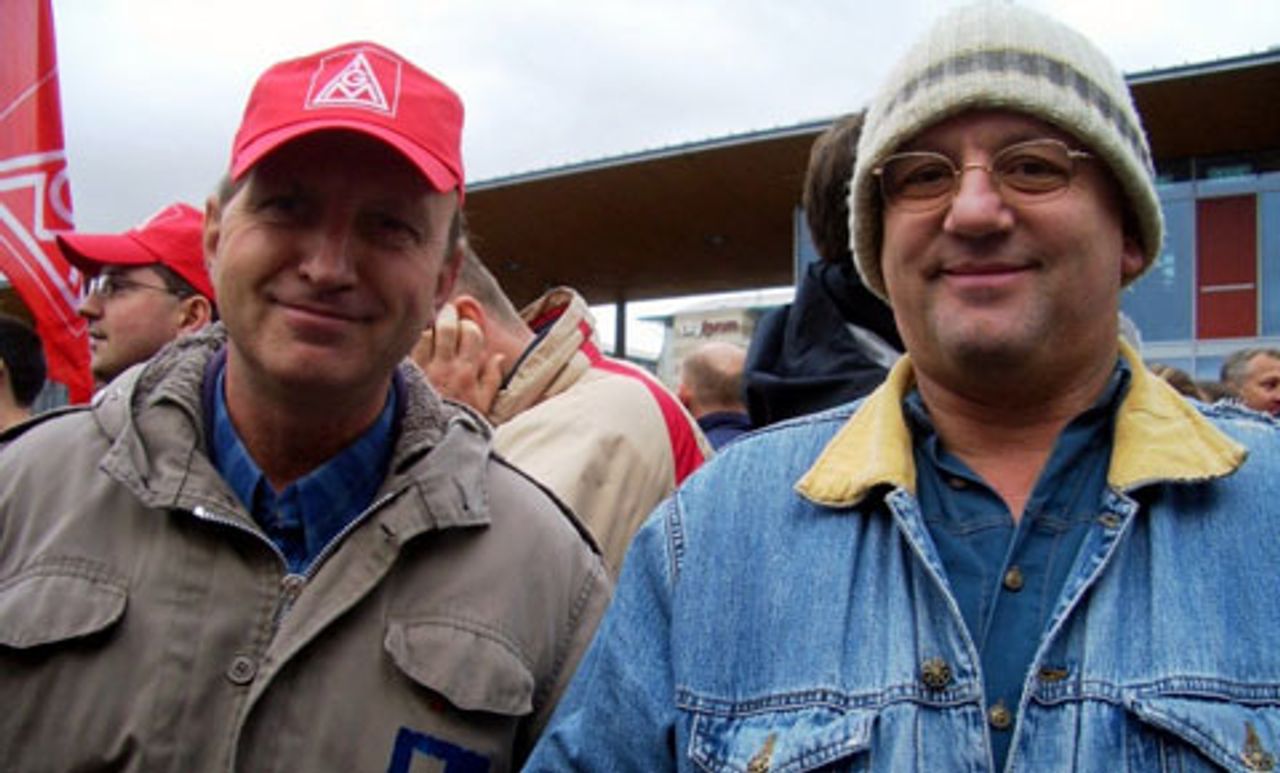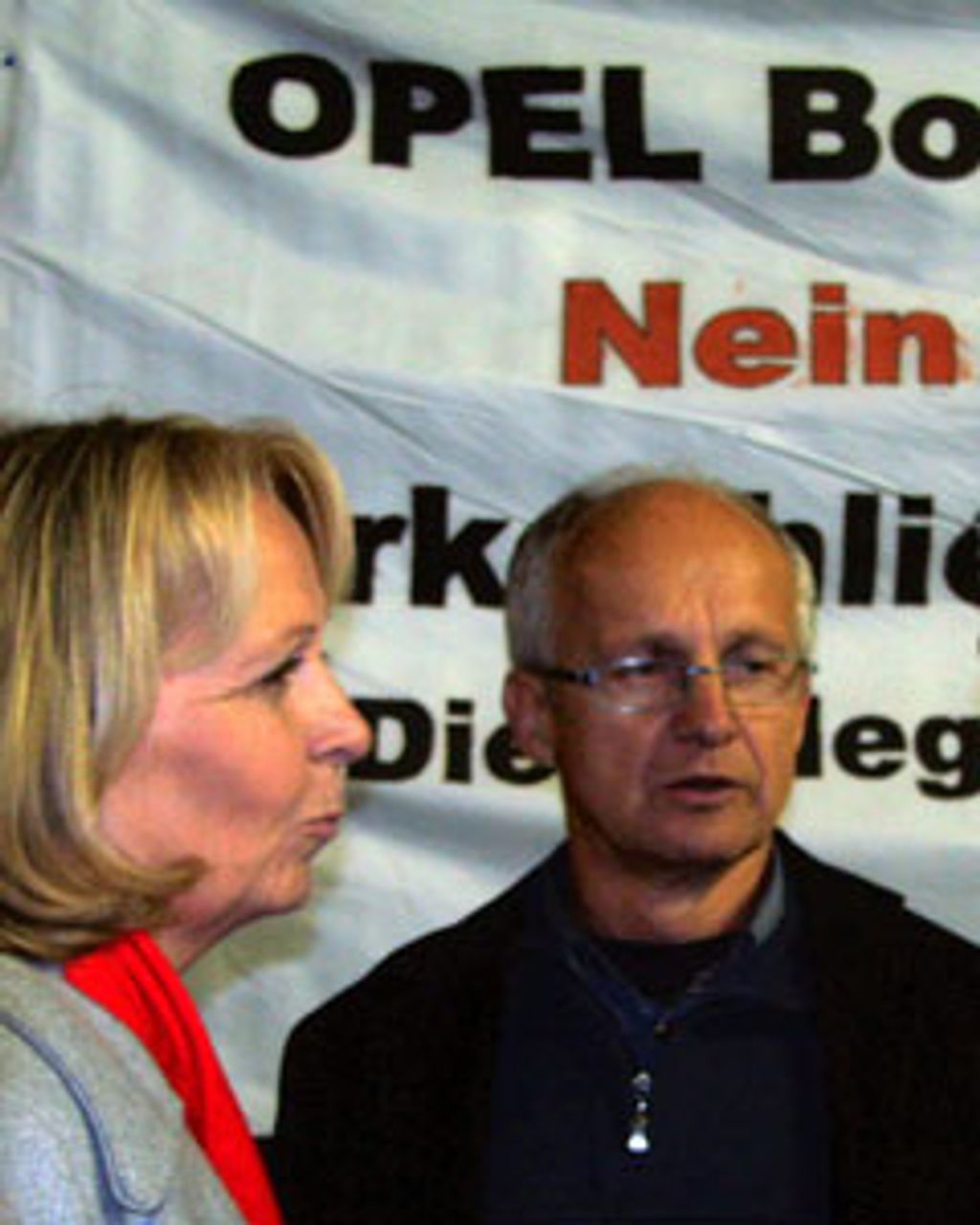On Wednesday, several thousand Opel workers took part in protests organized by the engineering trade union, IG Metall and its affiliated works councils. The demonstrations were directed against the decision taken by General Motors earlier this week not to sell Opel to the auto supplier company Magna. GM intends to implement massive job cuts in line with its own restructuring program and maintain control over its European Opel and Vauxhall plants.
There are in fact only minimal differences in the plans put forward by GM and Magna. But from the outset, the German works councils declared that the future of German Opel factories could only be secured on the basis of a Magna takeover. In collaboration with the German government, the unions sought to ensure that the largest proportion of job losses would be shifted to GM’s plants operating in Europe outside Germany.
Just one day before the GM board of directors made its decision in Detroit, the work councils had agreed to the Magna restructuring plan, which involved the slashing of nearly 11,000 jobs in Europe and annual wage cuts totalling €265 million for the remaining 40,000 European Opel/Vauxhall workers. The German work councils had thereby unanimously agreed to the closure of the Opel factory in Antwerp, Belgium.
The unstinting support for the Magna deal by the German works councils and IG Metall over the course of an entire year gave GM the breathing space to finalize its plans. At the same time, the union was able to ensure that any broad social opposition to the threat of mass redundancies remained muted in a period when both the European and German parliamentary elections took place.
From the outset the WSWS warned against the diversionary tactics adopted by the work councils, IG Metall and the government. It was obvious that the real attacks up to and including the insolvency of Opel would first be implemented after the Bundestag election.
On Wednesday evening, a month after the election, GM announced that at least 10,000 jobs would be cut in Europe and declared its aim to reduce “fixed costs” by 30 percent. Should these conditions not be accepted, GM threatened insolvency. GM, however, proposes to present a detailed concept for its European operations only in the first quarter of 2010.
The last GM plan, from the spring of 2009 (“Viability Plan Plus 2”), envisaged the shutdown of production at the German Bochum plant for the year 2011. The factories in Eisenach (also in Germany) and Antwerp were to close in 2010. Around 5,000 currently work in the Bochum plant, 1,800 in Eisenach and 2,600 in Antwerp. The German plant in Kaiserslautern, with 3,500 workers, is also regarded as “acutely endangered.”
In order to cover their tracks in this whole sordid affair, the Opel works council and IG Metall organized protests at the Opel plants in Rüsselsheim, Bochum, Eisenach and Kaiserslautern on Wednesday.
Rüsselsheim
At Rüsselsheim, around 5,000 of the plant’s total workforce of 18,000 assembled in front of the main Opel factory gates. They had stopped work for three hours in order to participate in the demonstration. In attendance and carrying placards and banners were employees from the company’s production and development centre as well as from its test centre in Dudenhofen.
Works council representatives spoke at the rally alongside the prime minister of the state of Hesse, Roland Koch (Christian Democratic Union, CDU), who gave the first speech. Koch, who is regarded as a right-winger in the conservative CDU, declared it was not often that the works council and the German government exchanged complements, but that “This works council has deserved it.” Koch pointed out that the leader of the IG Metall at Opel, Klaus Franz, had ensured the survival of the company with “financial contributions for the plant that had previously never been achieved.”
The next speaker was Franz, chairman of both the European and German joint works councils. He called upon the German state and federal government to free up funds in order to transform Opel into a German corporation and to “prevent GM from dictating terms.” His pep talk was aimed solely at spreading further confusion and defusing the anger of Opel workers over the current situation. Franz pledged to continue to work “responsibly” to secure the profitability of Opel by sacrificing the jobs and wages of the workforce.
WSWS reporters spoke with a number of Opel workers at the protest in Rüsselhiem, including Rolf and Harry from the test centre in Dudenhofen. When asked what should be done in Rüsselsheim if the plants at Bochum or Antwerp were closed, Rolf responded: “In my opinion, we should immediately all take part in joint strike action if anything happens, otherwise the whole business does not make sense. We must all act together, otherwise we will not get anywhere. In any case, we have no idea what will happens to us by the end of the year.” The two workers reported that the development centre at Rüsselsheim was also a potential candidate for closure.
 Rolf and Harry from the Dudenhofen test centre
Rolf and Harry from the Dudenhofen test centreThey closely studied the WSWS leaflet “The Opel Magna fraud,” which details how Klaus Franz and the works council chairman at Bochum, Rainer Einenkel, had already agreed to the closure of the Opel factory in Antwerp.
“It is hard to maintain any confidence now in the works council,” Harry said. “The government and works council solely backed a deal with Magna. Now they have been taken for a ride.” In reality, Magna only negotiated those terms that GM now plans to implement—along with even worse levels of cuts and dismissals. “The workers were never asked their opinion,” Harry said.
Karl, an employee from the development department, commented, “The human principle no longer counts for anything, all that matters is short-term profit.” He added, “None of us knows what to expect. We are once again at point zero, and the economic situation has not improved. Can we still trust the IG Metall? What alternative do we have? These are the questions that predominate here.”
Karl listed the financial benefits that Opel employees have so far sacrificed at the behest of the union. Holiday pay was finally paid out at the beginning of November, but workers have gone without their Christmas bonus as well as the agreed pay rise of 4.2 percent. “This amounts to a considerable sum and next year’s holiday pay is to be omitted completely,” he said.
Karl related that little information about what was happening at other plants was passed on to the workforce. He has little hope for the future: “It is very obvious that there is overcapacity on the market and now the Cash for Clunkers scheme has expired, meaning decreased sales—what can we expect in the future?”
 Students from the Friedrich Ebert school
Students from the Friedrich Ebert schoolA group of youth from the 9th class of the Friedrich Ebert School also demonstrated alongside their fathers, brothers and relatives, many of whom work at Opel. “Things look bad for us, this is why we are here,” one said. “We thought our future lay with Opel, but after the financial crisis we are fearful of what comes next. Ten thousand jobs stand on a knife’s edge. It is clear what one should do. That is why we are striking here with the Opel workers!”
Bochum
In Bochum, about 3,000 of the Opel plant’s workforce of 5,000 assembled for a demonstration on the factory premises. Those attending the rally included the North Rhine-Westphalian Prime Minister Jürgen Rüttgers (CDU), Bochum Mayor Ottilie Scholz (Social Democratic Party, SPD) and the SPD state chairman, Hannelore Kraft.
 Hannelore Kraft (SPD) and Rainer Einenkel
Hannelore Kraft (SPD) and Rainer EinenkelThe Bochum works council chairmen, Rainer Einenkel, declared he was horrified by the recent decision of the GM management in Detroit, but then sought to pacify the workers in attendance. This was no way to treat people, he said, but he then failed to announce any further protest actions. He stressed that the works councils had favoured a sale of the company to Magna to ensure that German factories stayed open. In addition, Magna had agreed that the new Zafira model would be built in Bochum. Now it would be necessary to transfer the transmission production department in Bochum to Austria.
Einenkel expressly thanked the politicians in attendance for their assistance at “this difficult time” and he especially praised the involvement of the North Rhine-Westphalian prime minister, who had travelled to Detroit.
He repeated the declaration of the joint works councils that “all contracts have to be thoroughly checked” and reiterated his fundamental agreement with the necessity for savings, “thereby securing our locations.” The contracts struck with management would have to be kept and were not subject to “correction.” In reality, the current contracts are not worth the paper they are written on. All of the promises made have been undertaken on condition that sufficient funding is available for their implementation.
Prime Minister Rüttgers repeated to the press his condemnation of General Motors, which with its “ruthless” and “contemptible” behaviour had shown the “ugly face of turbo-capitalism, which we do not want to see in North Rhine-Westphalia.”
The local head of IG Metall, Oliver Burkhardt, called upon GM management to put its cards on the table and reveal of its plans by the end of March 2010 (!) while respecting all past contractual obligations, so that “Bochum can continue in a reasonable manner.”
He then explained what he meant by “reasonable”—“A new Opel requires a new GM.”
Most workers followed the speeches with considerable scepticism. While they were visibly angry, they did not expect much from the demonstration.
One worker with 31 years at Opel, who asked not to be identified, declared that the deal with Magna had been worked out from the start to consciously deceive workers and force them to make even more concessions. The relatively small number of workers at the protest reflected the fact that others felt the same way. Only a third of the workforce responded to the appeal by the works council and trade union.
“They have allowed themselves to carry out the dirty work for Magna,” the worker continued. “Magna does not seem to be especially sad that the deal has folded. But they have continuously won concessions from us in the past years. The productivity drive has become increasingly intense. Workers leave the factory at the end of the week completely exhausted and are not feeling fit when they report for work again on Monday.”
He maintained that if environmentally friendly and affordable cars were produced, people would buy them. “However, that is not the issue. The leadership at GM is only interested in profit. That must be guaranteed, nothing else counts.”
A colleague declared that strikes or other protest measures at Opel made little sense. “Especially in Bochum. Everybody in the plants in the US and Europe should have been involved in the strike of 2004. Now they can just play us off one against the other.” He was especially angry with joint works council leader Klaus Franz, who repeatedly concentrates on Rüsselsheim and thereby plays into the hands of GM. “All workers must resist together,” the worker stressed.
The Left Party sprang to the support of the works councils and trade unions and had sent a delegation to the factory gates, including party executive member Sarah Wagenknecht. The Left Party enjoys close links to the trade unions in North Rhine-Westphalia, and the delegation distributed a leaflet calling on the conservative German chancellor, Angela Merkel, to negotiate with the Obama administration in the US and the trade unions on the future of Opel, i.e., to negotiate with all those parties responsible for the current dire situation facing Opel workers.
By assigning blame solely to GM management, the Left Party, the Opel works councils and the trade unions are rushing to cover the tracks of the trade unions and the Merkel government. The Left Party shares the fears within government circles and the trade union leadership that workers may break from the works councils and trade unions and take up their own independent struggle to defend jobs in alliance with workers throughout Europe and the US.
Subscribe to the IWA-RFC Newsletter
Get email updates on workers’ struggles and a global perspective from the International Workers Alliance of Rank-and-File Committees.
